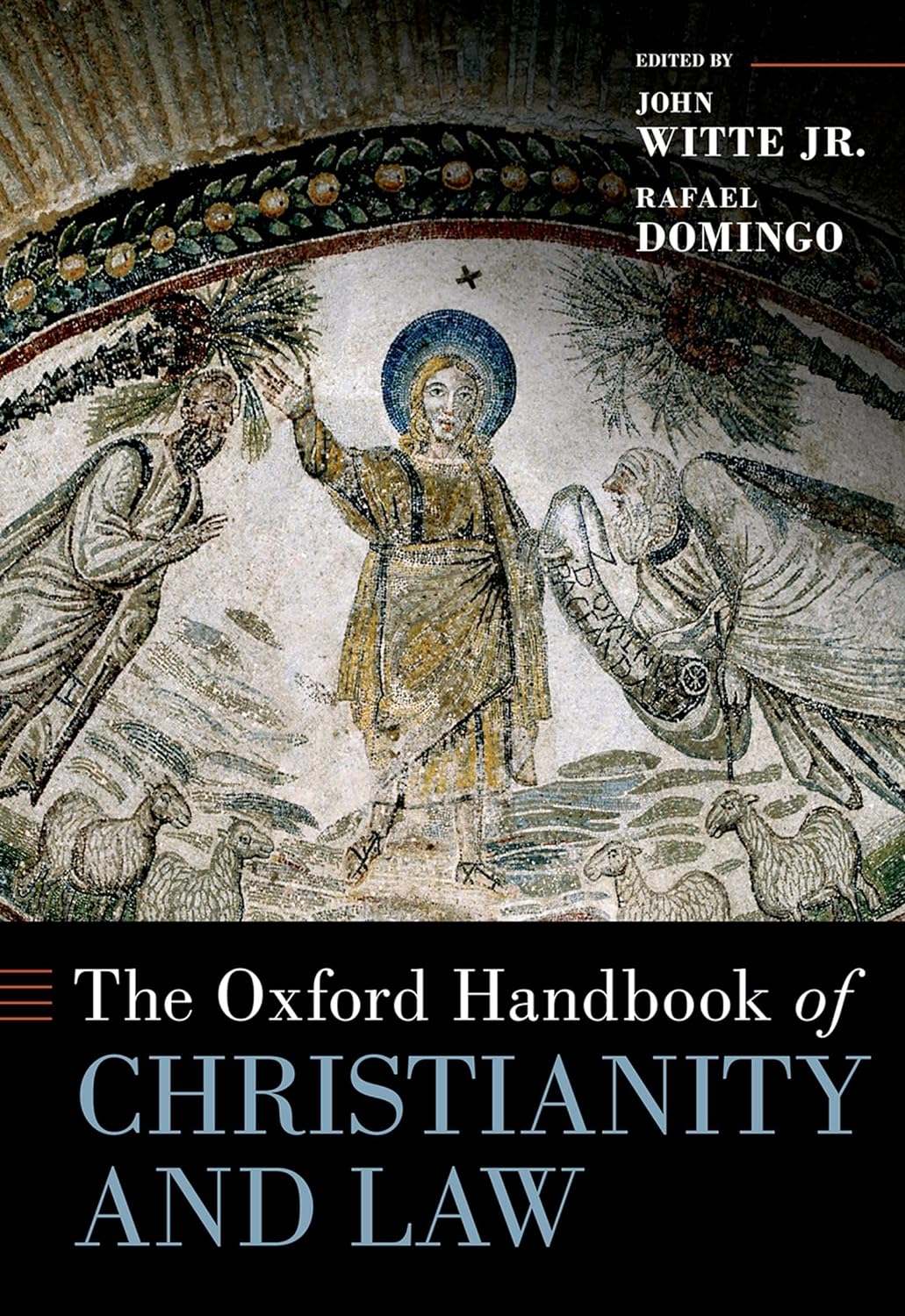
The Oxford Handbook of Christianity and Law
John Witte, Jr. and Rafael Domingo
This text is excerpted in part from the front matter of the Oxford Handbook of Christianity and Law, edited by John Witte, Jr. and Rafael Domingo (New York/Oxford: Oxford University Press, 2023) and is used herein with permission.
This hefty new volume, over 900 pages, provides an authoritative and accessible global analysis of the interactions of Christianity and law—historically and today, in theory and in practice. Collected in these pages are sixty chapters commissioned from a diverse group of leading scholars from six continents. While many chapters are written from a strong legal and historical perspective, most offer deep theological, ethical, political, philosophical, sociological, and economic perspectives as well.
The chapters fall into six main parts. Part I takes up Christian contributions to law and legal thought over the past two millennia. Part II offers a comparative study of the state of law and Christianity around the world today. Part III analyzes Christian contributions to core areas of public, private, penal, and procedural law. Part IV reviews various issues of canon law, natural law, religious freedom, and church-state relationships, both domestically and internationally. Part V addresses Christian contributions to several cutting-edge areas of law and public policy today. Part VI reflects on Christian contributions to several fundamental principles of law and legal order. Together, the chapters make clear that Christianity and law have had a perennial and permanent influence on each other over time and across cultures, albeit with varying levels of intensity and through various modes of interaction.
We define Christianity broadly to include Catholic, Protestant, and Orthodox traditions and various denominations within them—both in the traditional Christian heartlands of the Middle East, North Africa, Europe, and the Americas and now throughout Africa, Asia, Eurasia, and Oceania, too. We draw from Christian ideas and institutions, norms and practices, texts and titans to tell the story of Christianity’s engagement with the world of law over the past two millennia. While many of our authors are practicing Christians, they present their work in professional, not confessional terms, consigning to footnotes occasional references to more overtly normative and apologetic work. While many of our authors engage a wide range of Christian legal teachings, the longstanding Catholic and Protestant legal traditions in the West are more prominently presented in these pages than are the more sporadic engagements with law among ancient Eastern Orthodox Christians and newer Christian communities in the Global South and East. As the global forms and forums of Christianity and law deepen and diversify in this new millennium, this already hefty volume will eventually need an expanded edition or a weighty sequel.
We also define law broadly as the normative order of justice, power, and freedom, operating in all dimensions of human existence and relationships. Together, the chapters discuss the natural laws of conscience, reason, and the Bible and the positive laws enacted by states, churches, and other voluntary associations such as corporations, guilds, and monasteries. The chapters take up laws that are local and national, domestic and international, legislative and judge-made, written and unwritten, codified and customary. Several chapters focus on specific types of positive law and procedure—canon law, family law, constitutional law, criminal law, human rights law, and laws governing taxation, contracts, property, and more. Other chapters take up fundamental legal principles—liberty, dignity, equality, justice, equity, judgment, sovereignty, power, and solidarity. Some chapters differentiate the law on the books from the law in action; the rules and procedures prescribed by authorities versus the behavior by citizens, officials, and legal professionals in positive, negative, or indifferent response. And beneath all these legal typologies is the reality that laws of various sorts emerge out of an evolving spectrum of normativity: acts become behaviors; behaviors become habits; habits yield customs; customs produce rules; rules beget statutes; statutes require procedures; procedures guide cases; statutes, procedures, and cases get systematized into codes; and all these forms of legality are eventually confirmed in national constitutions if not regional conventions and international covenants, inspired by global legal principles and values.

This handbook constitutes the first comprehensive global collection on Christianity and law. It builds on the broader study of law and religion that has emerged in the academy over the past half century—now involving some two thousand scholars, many of them gathered in the fifty-plus centers and institutes of law and religion around the world today. These scholars are studying the religious dimensions of law, the legal dimensions of religion, and the interaction of legal and religious ideas and institutions, methods and practices.
The modern study of Christianity and law has produced a strong new body of scholarship in the field of law and religion alongside comparable studies of law and Judaism, Islam, Buddhism, Hinduism, and Indigenous traditions. To be sure, Christian scholars of law do address many questions that are familiar to any serious scholar of law, whatever their persuasion — questions concerning the nature and purpose of law and authority, the mandates and limits of rule and obedience, the rights and duties of officials and subjects, the care and nurture of the needy and innocent, the justice and limits of war and violence, the nature of fault and the means of punishing it, the sources of obligations and the procedures for vindicating them, the origins of property and the means of protecting it. On many such questions of legal doctrine, science, and philosophy, Christian sources and scholars are not noticeably different from their peers with different or no clear religious convictions.
But Christian scholars, historically and today, also address questions that are more specifically Christian in accent but no less important to understanding law and politics: Are persons fundamentally good or evil? Is human nature essentially rational or relational? Is law inherently coercive or liberating? Is law a stairway to heaven or a fence against hell? Did law and government predate or postdate the fall into sin? Should authorities only proscribe vices or also prescribe virtues? Is the state a divine or a popular sovereign? Are social institutions fundamentally hierarchical or egalitarian in internal structure and external relations? Are they rooted in creation or custom, covenant or contract? What is the place of law and legal procedure in the church, and how must it be enforced? What is the place of democracy in the church, and how is it to be exercised? What is the role of the church in exemplifying and advocating justice for itself and for other institutions, for its own members and for other individuals? What is the relationship between crime and sin, contract and covenant, justice and righteousness, mercy and love? What do the Bible and the Christian tradition and experience teach about the fundamentals of law and liberty, faith and order?
Beyond these “weightier matters of the law,” Christian scholars also address more technical topics of canon law and natural law, conscience and commandment, contract and promise, evidence and proof, marriage and family, crime and punishment, property and poverty, liberty and dignity, church and state, business and commerce. These topics and others were perennial staples of jurisprudence, philosophy, and theology in the West, and Christianity helped to shape many of the legal ideas and institutions that still dominate the world of law today. Some of these legal creations were original to Christianity, born of keen new biblical insight and theological ingenuity. Others were converted and recast from Hebrew and Graeco-Roman prototypes. Still others were reworked and reformed by Renaissance humanists and Enlightenment philosophes and their ample modern progeny. And these contributions have been furthered leavened if not transformed through the globalization of Christianity and the shaping influence of non-Western cultures and religions in the past few centuries. But whether original or reformed, canonical or casuistic, Western or global these Christian teachings on law, politics, and society have made and can make enduring contributions to the development of law as we know it today.
These are some of the many questions that come up for analysis in this handbook on Christianity and law. This volume builds on dozens of Oxford handbooks already published on Christianity and theology, politics, ethics, philosophy, music, art, economics, and other topics. Law is a universal solvent of human living, and it now happily has a comparable interdisciplinary study of the interactions of law and Christianity over time and across cultures.♦

John Witte, Jr. is the Woodruff University Professor, McDonald Distinguished Professor, and Faculty Director of the Center for the Study of Law and Religion at Emory University.

Rafael Domingo is the Álvaro d’Ors Professor of Law at the University of Navarra and Senior Fellow in the Center for the Study of Law and Religion.
Recommended Citation
Witte, Jr, John and Rafael Domingo. “The Oxford Handbook of Christianity and Law.” Canopy Forum, January 22, 2024. https://canopyforum.org/2024/01/22/the-oxford-handbook-of-christianity-and-law/.

